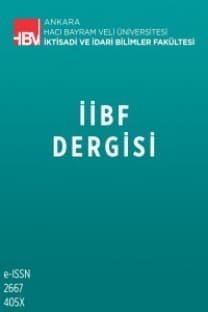NARSİSTİK KİŞİLİK ENVANTERİ’NİN TÜRKÇE’YE STANDARDİZASYONU
Narsisizm, yazında ilk kez Psikiyatri ve Klinik Psikoloji bilim dalları tarafından tanımlanmış olmasına rağmen, günümüzde örgütsel davranış ve yönetim alanlarının araştırma konuları arasına girmiştir. Özellikle son yıllarda narsisizmin örgütlere yansımalarını konu alan uluslararası araştırmaların sayısında artış gözlenmektedir. Araştırma sonuçlarına göre; işgören tutum ve davranışlarına yön verebilen narsisizm, liderlerde görüldüğünde örgüt açısından bir risk ya da kazanca dönüşebilmektedir. Ulusal yazın incelendiğinde ise konuya ilişkin çalışma sayısının azlığı, araştırmacılar açısından narsisizmin hala patolojik bir olgu olarak algılandığı şeklinde açıklanabilir. Bu makale ile örgütsel davranış ve insan kaynakları yönetimi gibi alanlarda çalışan araştırmacıların ilgisinin çekilmesi ve klinik amaçlı olmayan bir narsisizm ölçeğinin kullanımlarına sunulması amaçlanmıştır. Araştırma kapsamında, uluslararası literatürde yaygın olarak kullanılan ve 2006 yılında 16 soruya indirgenen Narsistik Kişilik Envanteri-NKE’nin (Narcissistic Personality Inventory-NPI) Türkçe’ye standardizasyonu yapılmıştır. Ölçek iki farklı akademisyen tarafından Türkçe’ye tercüme edilmiş ve üçüncü bir akademisyen tarafından geri çevirisi yapılarak aslına uygunluğu kontrol edilmiştir. İki ayrı örneklem üzerinde, ölçeğin iç güvenirliği ve yapısal geçerliliği test edilmiştir. Üniversite öğrencileri üzerinde gerçekleştirilen pilot uygulama sonucunda, ölçek güvenirliğini düşüren ve ölçeğe anlamlı katkıda bulunmadığı görülen ifadeler revize edilmiştir. Araştırmanın ikinci örneklemini ulusal ve uluslararası ölçekteki işletmelerin çalışanları oluşturmuştur. Elde edilen bulgulara göre NKE ’nin yeterli güvenirlik ve geçerlilik değerlerine sahip olduğu görülmüştür.
Anahtar Kelimeler:
Narsisizm, Narsistik Kişilik Envanteri, Güvenirlik, Geçerlilik, Standardizasyon
THE STANDARDIZATION OF NARCISSISTIC PERSONALITY INVENTORY INTO TURKISH
Narcissism has been firstly defined in the literature of Psychiatry and Clinical Psychology as a severe personality disorder; however the notion has recently been one of the popular subjects of research in both organizational behavior and management sciences. A significant increase is observed in the number of international research about the reflection of narcissism on organizations in recent years. According to the results of these researches, narcissism can conduct employees’ attitudes and behaviors; moreover, narcissistic leaders can create a risk or a gain for organizations. The lack of national studies on the subject can be explained as narcissism is still perceived as a pathological fact by researchers. In this article, it is aimed to attract human resources management and organization behavior researchers’ interest to narcissism and to present a non-clinical scale for their use. In scope of the research, the shorter form of Narcissistic Personality Inventory (NPI), including 16 items has been standardized into Turkish. NPI-16 item has originally been developed and validated in 2006 and is a widely used scale in international literature. The scale consists of six dimensions which are authority, self-sufficiency, exhibitionism, entitlement, superiority and exploitativeness. The language equivalence was provided by translation-back translation process for the standardization by two bilingual academicians. According to the comparison between original form and back translated version of Turkish NPI, necessary revisions were made. Two separate studies have been conducted for testing the reliability and validity of the translated scale. The questionnaire has included NPI and some demographic questions such as gender, age and education level. It was applied via internet-based survey software and the link of the survey was sent to the participants by email. Eighty nine students from Business Administration Department of Marmara University and Industrial Engineering Department of Istanbul Technical University participated in the pilot study. The reliability of the scale was found sufficient; however, the item-total correlations of four items were found negative. Therefore, revisions have been made in those items. The second sample consisted of one hundred sixty-eight participants who are working in national and international companies from twenty-nine different sectors. The revised inventory was conducted in the second study and the reliability and structural validity of the scale was tested. Item-total correlations of all questions were examined. It was found that the 8th question decreased the reliability of the standardized scale and had negative correlation. Therefore it was taken out of the scale and afterwards, the reliability of the standardized NPI was found sufficient and consistent with the original form of the scale. In frame of the structural validity, principal component based exploratory factor analysis was conducted. Since the correlation between the subdimensions of the scale was low, Varimax method was preferred in the factor analysis. The validity has been proved showing that the standardized scale has the same factors with the original form. Moreover, the total variance explained the factors was found 60,8 % which is adequate. The differences between groups were examined by ANOVA, Welsch and Brown Forsythe tests according to their homogeneity. There is no significant relationship found between the gender, age and education level characteristics and narcissism score of the participants. The language equivalence, reliability and validity of Turkish NPI are provided in the frame of this study. The scale is expected to promote new explanatory and comparative studies about narcissism. Since organizational commitment, performance, motivation are fundamental concepts in organizational behavior field, it is possible to relate those concepts with narcissism. The reflections of narcissistic dispositions of leaders on organizational components such as leader-member exchange and decisionmaking processes are among the topics expected to be investigated. Further, narcissism level of managers and their socio-demographic characteristics might be another subject for new researches.
Keywords:
Narcissism, Narcissistic Personality Inventory (NPI), Reliability, Validity Standardization,
- Yayın Aralığı: Yılda 3 Sayı
- Başlangıç: 1999
- Yayıncı: Ankara Hacı Bayram Veli Üniversitesi
Sayıdaki Diğer Makaleler
TÜRK ELEKTRİK DAĞITIM SEKTÖRÜNDE HİZMET KALİTESİNE YÖNELİK ÖZENDİRİCİ BİR DÜZENLEME UYGULAMASI
HEDEF PROGRAMLAMA TEKNİĞİ İLE MENÜ PLANLAMASI
KÜRESELLEŞME VE YERELLEŞME: BİR ÇELİŞKİ Mİ?
AVRUPA ÜLKELERİNE GÖÇ EDEN TÜRK İŞÇİLERİN İKTİSADİ ETKİNLİĞE KATKISI
Emre Güneşer BOZDAĞ, Murat ATAN
Ulaş ÜNLÜ, Ali BAYRAKDAROĞLU, İlhan EGE
MOTİVASYON ÜZERİNDE ULUSAL KÜLTÜR ETKİSİ
